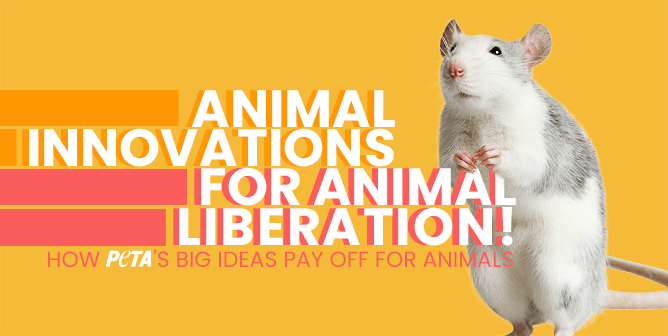PETA’s Innovation Fund: Creating BIG Ideas for Animal Liberation
PETA’s Science, Technology, and Innovation Fund
From investing in animal-free test methods to accelerating the development of vegan fabrics and from guiding college students through eye-opening virtual reality experiences to making fast food hipper, healthier, and kinder, PETA is helping companies and consumers choose compassion instead of cruelty. The Innovation Fund allows us to reduce suffering in every industry with practical, cost-effective, and forward-thinking solutions.

Innovating Research—Because Animals Aren’t Living Test Tubes
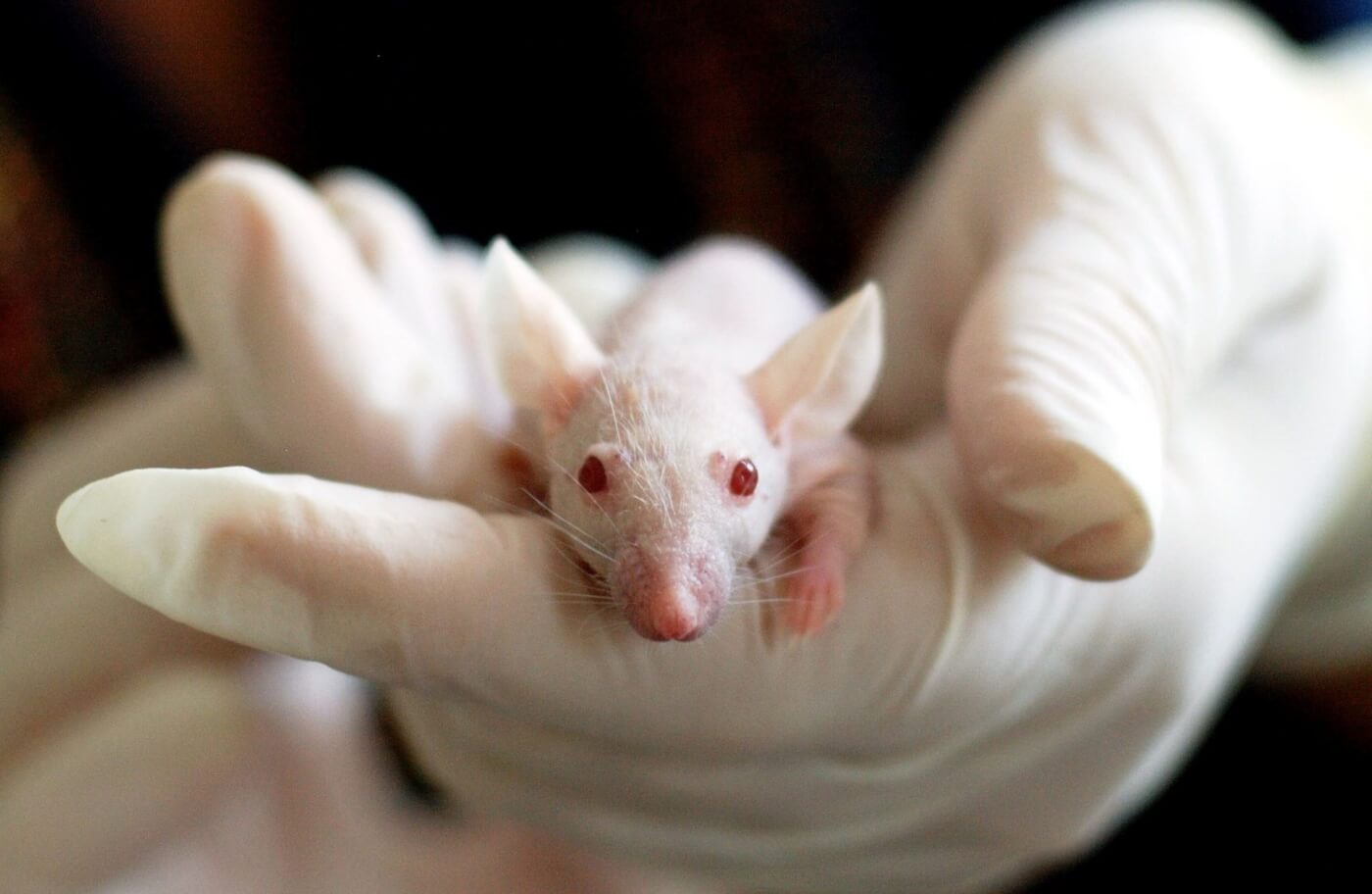
Hundreds of millions of animals suffer and are killed in experiments every year—more than 100 million in the U.S. alone! Many torturous animal test methods are more than a century old, and today’s experts recognize that killing animals does nothing to help humans.
That’s why PETA entity scientists are leading the movement to replace animal tests with tools and methods such as cell-based (in vitro) experiments, human-relevant high-speed computer models, human-based tissue engineering, cancer organoids, and epidemiology studies that produce results.
These top-notch scientists comprise PETA Science Consortium International e.V., the largest team of scientists of any animal rights organization in the world. It works with government agencies, developers, academics, industries, and nonprofits to advance the best non-animal scientific methods—and it has donated millions of dollars toward the development and implementation of cruelty-free test methods.
The Science Consortium is also the brains behind the world’s first-ever road map to replace all tests on animals in every country: the Research Modernization Deal. After its members were presented with this game-changing proposal, the European Parliament voted overwhelmingly in favor of an action plan to phase out animal tests throughout the European Union. PETA scientists are pushing other countries—including India, the Netherlands, the U.K., and the U.S.—to embrace the Research Modernization Deal, too.
Revamping Restaurants and Kitchens—Because Animals Aren’t Ours to Eat

In the U.S., 99% of animals used for food are kept on factory farms, crammed by the thousands into filthy, windowless sheds. PETA’s revelatory investigations, eye-catching demonstrations, delectable giveaways, and colorful advertisements keep the public informed about the cruelty inherent in the animal agriculture industry and encourage people to make better choices every day. More than 20 years ago, we were the original funder of cell-based or in vitro “clean meat” development!
Today, diners can save lives and safeguard their health by choosing vegan versions of their favorite foods, whether at the supermarket or in a fast-food drive-through.
In addition to publishing and distributing hundreds of thousands of vegan starter kits each year, PETA collaborates with companies producing innovative and flavorful vegan fare, offers awards to highlight the newest and best animal-free products, and partners with celebrities who endorse healthy, humane foods.
We even have a sweet animatronic cow mascot named Carly (voiced by PETA Honorary Director Alicia Silverstone), who visits elementary schools across the U.S. to share her story and encourage children to eat dairy-free.
Revolutionizing Fashion—Because Animals’ Skin Is Their Own
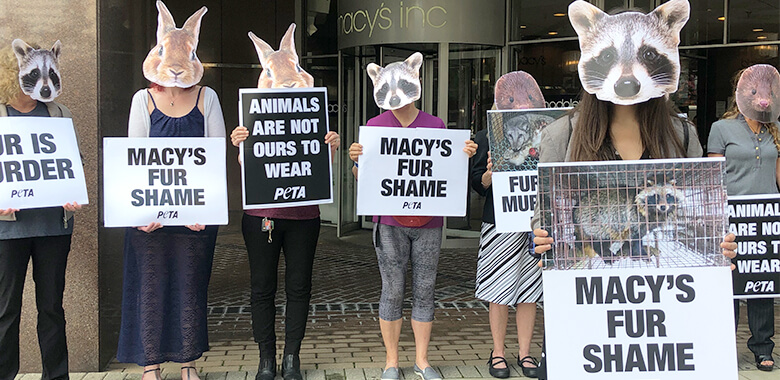
After declaring decades ago that “fur is dead,” PETA is now taking down every single vile material made from animal torment—and accelerating the development of cruelty-free materials to swap for animals’ fur, feathers, and skin.
Our earth-shaking exposés give shoppers and global brands a glimpse into rabbit farms in China, shearing sheds in Australia and South America, reptile pools in Indonesia, and other hideous, blood-soaked places that turn animals into victims of the fashion industry.
PETA has virtually wiped out the fur, angora, and mohair industries, and we’re now using creative tactics to do the same with alpaca fleece, wool, leather, silk, and exotic-animal skin.
Our methods work: We partnered with renowned retailer H&M to launch its first-ever all-vegan fashion line. Outerwear giant The North Face bowed to campaign pressure and created a feather-free filler to replace birds’ down feathers in many of its puffer jackets. Canada Goose, a former PETA target, is now meeting with our team regularly to share its progress in replacing wool and down with innovative, non-animal materials.
PETA conceived of the Material Innovation Initiative, which now links top fashion brands with textile startups, and we provided major funding to get the plan off the ground. Our PETA Business Friends also boast high-tech, luxurious materials in their clothing and accessories.
There Is ALWAYS a Better Way—Other Innovations for Animal Liberation
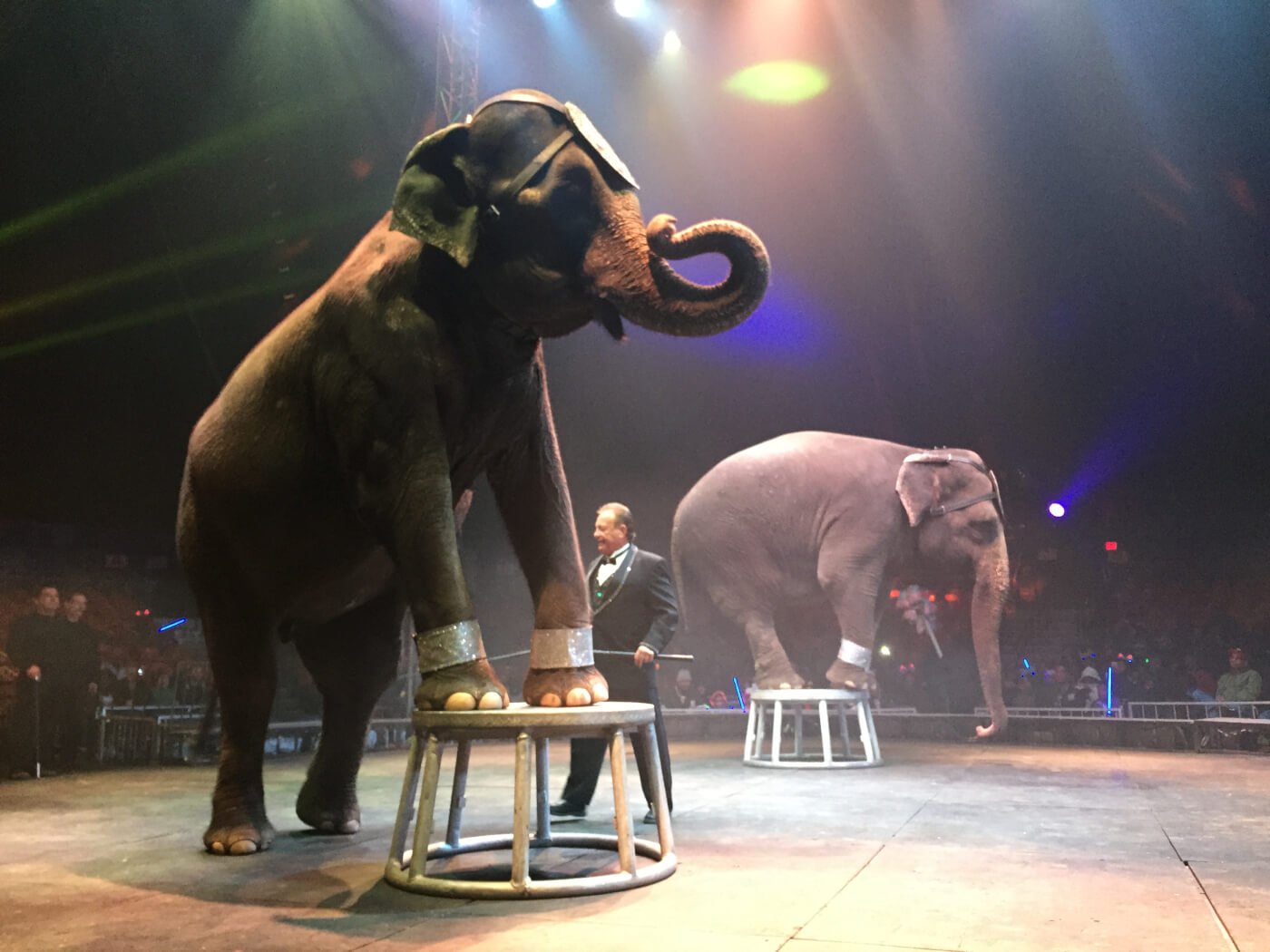
PETA highlights other amazing innovations to show every industry why there’s no excuse to exploit animals.
Forcing the Entertainment Industry to Evolve
Our celebrated success against Ringling Bros. and Barnum & Bailey Circus is just one example of how PETA is forcing the entertainment industry to evolve. Recently, that once-notorious outfit announced its return to the big top—without forcing any nonconsenting animals to perform! We’ve decimated the big-cat cub-petting industry through petitions, lawsuits, and other means, and the few remaining roadside zoos are in our crosshairs. PETA’s lovable animatronic elephant, Ellie, and bear, Bernard, are instilling compassion in students and teaching them to steer clear of animal-abusing tourist traps.
A powerful PETA video depicting an extremely lifelike computer-generated chimpanzee set the standard for Hollywood years ago—and today, our campaigns regularly spark boycotts of any movies or TV shows that still use live animals. We’ve also given our own special “Oscat” nods and other awards to movies and shows that spare animals by using masterful computer-generated imagery. And PETA has the entertainment industry’s first-ever confidential hotline for whistleblowers to report animal abuse on set.
PETA has been on the front line of the campaign against cetacean captivity for decades, and in the wake of the release of a breathtaking robotic dolphin named Delle, we’re ramping up pressure even more on SeaWorld and other marine parks to release live animals to reputable seaside sanctuaries.
We were the first group ever to expose the rampant misuse of drugs in the horse racing industry, and we’ve pushed hard for significant reforms (like implementing CT scanning and upgrading track surfaces) that can help spare Thoroughbreds deadly breakdowns. PETA U.S. also proposed first-of-its-kind technology in betting terminals so that bettors can donate toward horses’ safe retirement.
Saving Animals in Every Way
PETA entities lead international campaigns against terrifyingly loud fireworks shows, urging event organizers to switch out the explosives for silent laser displays that won’t frighten companion animals or threaten wildlife. And PETA U.S. actively promotes humane training methods for K-9s (while publicly challenging anyone who perpetuates violence toward them) and cheers the development of technology that can replace guide dogs—who are often selectively bred only to be of service to humans. We also condemn the use of dolphins, dogs, and other animals as mere machines of war.
Mechanizing Industries—Because Animals Deserve a Peaceful Retirement
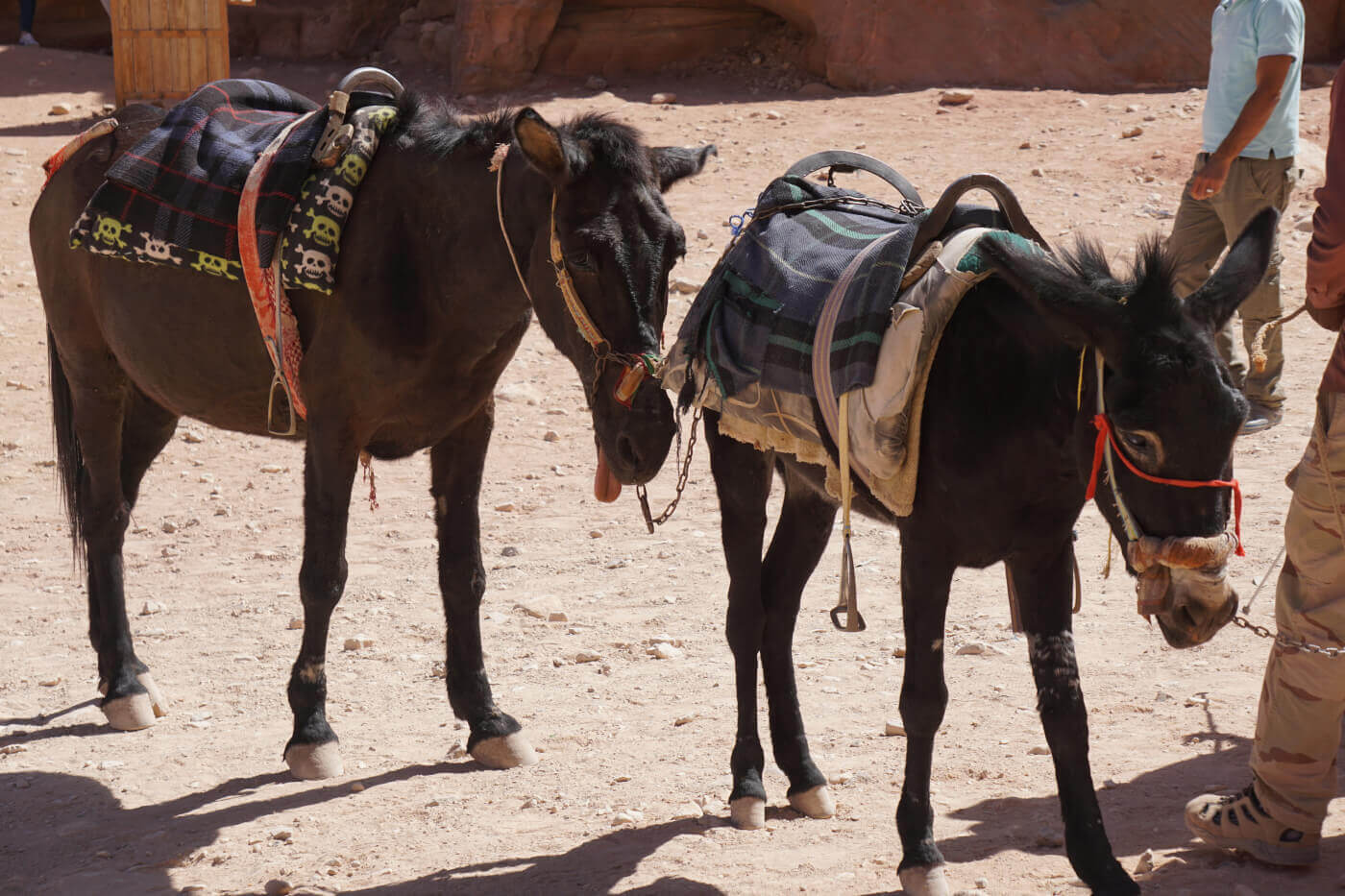
PETA entities and partner organizations are changing lives in India, Jordan, and elsewhere by providing overworked animals with care and pushing to replace them with eco-friendly electric vehicles.
Animal Rahat (rahat means “relief” in Hindi), an organization in India supported by PETA U.S., has saved tens of thousands of bulls from backbreaking labor at sugar factories—where they were forced to haul carts piled sky-high with sugarcane without rest or water breaks. Now, factory workers haul sugarcane using tractors donated by Animal Rahat.
Animal Rahat has also rescued more than 230 donkeys from being forced to drag bricks and helped 16 brick kilns go animal-free! Mechanization is better for workers, too—allowing them to improve their standard of living and spend more time with their families.
PETA India succeeded years ago in getting horse-drawn carriages banned in Mumbai and recently arranged for the surrender of five bulls made to haul massive loads of ice by providing their former owners with vehicles. The group is now focused on mechanizing Delhi’s rickshaw industry—replacing horses and bulls with electric rickshaws, which will give humans a more reliable method of transporting goods—and getting emaciated, injured horses off the streets of Kolkata. PETA India is also leading the charge to end elephant abuse at Amer Fort and to see those majestic animals replaced with chariot-like electric vehicles.
Big ideas for animals can become action only through the generous support of PETA U.S. members. Please make a tremendous difference for animals and power our forward-thinking, lifesaving projects by supporting the Innovation Fund!

